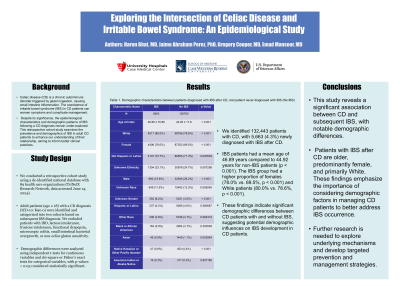Monday Poster Session
Category: Small Intestine
P3197 - Exploring the Intersection of Celiac Disease and Irritable Bowel Syndrome: An Epidemiological Study
Monday, October 28, 2024
10:30 AM - 4:00 PM ET
Location: Exhibit Hall E

Has Audio

Harun Bhat, MD
University Hospitals Cleveland Medical Center, Case Western Reserve University
Cleveland, OH
Presenting Author(s)
Harun Bhat, MD1, Jaime A. Perez, PhD2, Gregory Cooper, MD3, Emad Mansoor, MD3
1University Hospitals Cleveland Medical Center, Case Western Reserve University, Cleveland, OH; 2University Hospitals Clinical Research Center, Cleveland, OH; 3Digestive Health Institute, University Hospitals Cleveland Medical Center, Cleveland, OH
Introduction: Celiac disease (CD) is a chronic autoimmune disorder triggered by gluten ingestion, causing small intestine inflammation. The coexistence of irritable bowel syndrome (IBS) in CD patients can worsen symptoms and complicate management. Despite its significance, the epidemiological characteristics and demographic patterns of IBS following a CD diagnosis remain under-explored. This retrospective cohort study examines the prevalence and demographics of IBS in adult CD patients to enhance our understanding of their relationship, aiming to inform better clinical practices.
Methods: We conducted a retrospective cohort study using a de-identified national database with 89 health care organizations (TriNetX Research Network, data accessed June 14, 2024). Adult patients (age ≥ 18) with a CD diagnosis (ICD-10: K90.0) were identified and categorized into two cohorts based on subsequent IBS diagnosis. We excluded patients with IBD, lactose intolerance, fructose intolerance, functional dyspepsia, microscopic colitis, small intestinal bacterial overgrowth, or non-celiac gluten sensitivity. Demographic differences were analyzed using independent t-tests for continuous variables and chi-square or Fisher’s exact tests for categorical variables, with p-values < 0.05 considered statistically significant.
Results: We identified 132,443 patients with CD, with 5,663 (4.3%) newly diagnosed with IBS after CD. IBS patients had a mean age of 46.89 years compared to 44.92 years for non-IBS patients (p < 0.001). The IBS group had a higher proportion of females (78.0% vs. 69.5%, p < 0.001) and White patients (80.0% vs. 78.6%, p < 0.001). These findings indicate significant demographic differences between CD patients with and without IBS, suggesting potential demographic influences on IBS development in CD patients.
Discussion: This study reveals a significant association between CD and subsequent IBS, with notable demographic differences. Patients with IBS after CD are older, predominantly female, and primarily White. These findings emphasize the importance of considering demographic factors in managing CD patients to better address IBS occurrence. Further research is needed to explore underlying mechanisms and develop targeted prevention and management strategies.
Disclosures:
Harun Bhat, MD1, Jaime A. Perez, PhD2, Gregory Cooper, MD3, Emad Mansoor, MD3. P3197 - Exploring the Intersection of Celiac Disease and Irritable Bowel Syndrome: An Epidemiological Study, ACG 2024 Annual Scientific Meeting Abstracts. Philadelphia, PA: American College of Gastroenterology.
1University Hospitals Cleveland Medical Center, Case Western Reserve University, Cleveland, OH; 2University Hospitals Clinical Research Center, Cleveland, OH; 3Digestive Health Institute, University Hospitals Cleveland Medical Center, Cleveland, OH
Introduction: Celiac disease (CD) is a chronic autoimmune disorder triggered by gluten ingestion, causing small intestine inflammation. The coexistence of irritable bowel syndrome (IBS) in CD patients can worsen symptoms and complicate management. Despite its significance, the epidemiological characteristics and demographic patterns of IBS following a CD diagnosis remain under-explored. This retrospective cohort study examines the prevalence and demographics of IBS in adult CD patients to enhance our understanding of their relationship, aiming to inform better clinical practices.
Methods: We conducted a retrospective cohort study using a de-identified national database with 89 health care organizations (TriNetX Research Network, data accessed June 14, 2024). Adult patients (age ≥ 18) with a CD diagnosis (ICD-10: K90.0) were identified and categorized into two cohorts based on subsequent IBS diagnosis. We excluded patients with IBD, lactose intolerance, fructose intolerance, functional dyspepsia, microscopic colitis, small intestinal bacterial overgrowth, or non-celiac gluten sensitivity. Demographic differences were analyzed using independent t-tests for continuous variables and chi-square or Fisher’s exact tests for categorical variables, with p-values < 0.05 considered statistically significant.
Results: We identified 132,443 patients with CD, with 5,663 (4.3%) newly diagnosed with IBS after CD. IBS patients had a mean age of 46.89 years compared to 44.92 years for non-IBS patients (p < 0.001). The IBS group had a higher proportion of females (78.0% vs. 69.5%, p < 0.001) and White patients (80.0% vs. 78.6%, p < 0.001). These findings indicate significant demographic differences between CD patients with and without IBS, suggesting potential demographic influences on IBS development in CD patients.
Discussion: This study reveals a significant association between CD and subsequent IBS, with notable demographic differences. Patients with IBS after CD are older, predominantly female, and primarily White. These findings emphasize the importance of considering demographic factors in managing CD patients to better address IBS occurrence. Further research is needed to explore underlying mechanisms and develop targeted prevention and management strategies.
Disclosures:
Harun Bhat indicated no relevant financial relationships.
Jaime Perez indicated no relevant financial relationships.
Gregory Cooper indicated no relevant financial relationships.
Emad Mansoor: Lilly – Speakers Bureau. Takeda – Speakers Bureau.
Harun Bhat, MD1, Jaime A. Perez, PhD2, Gregory Cooper, MD3, Emad Mansoor, MD3. P3197 - Exploring the Intersection of Celiac Disease and Irritable Bowel Syndrome: An Epidemiological Study, ACG 2024 Annual Scientific Meeting Abstracts. Philadelphia, PA: American College of Gastroenterology.
